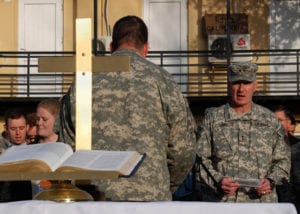God asked the biblical prophet Ezekiel the question, “How is the wood of the vine better than any other wood, the vine branch which is among the trees of the forest? Is wood taken from it to make any object? Or can men make a peg from it to hang any vessel on?” (Ezekiel 15:2-3, New King James Version).
No. The vine is not prized for its lumber. It’s typically short, bent, and twisted and, as Ezekiel points out, vines aren’t even good for making pegs, much less for building houses. No, the vine is not valued for its lumber, but for its fruit. And it gives this fruit perennially, in contrast to the pine and the fir tree which can be harvested only once.
The same is true for all fruit-bearing trees – at least for those whose fruit is fit for human consumption: the apple tree, the peach, plum, orange, pear, etc. Yes, the cherry and the walnut can be fashioned into cabinets, but not into houses. All these trees are only good for the fruit they bear.
But suppose a lumberjack strolls into a vineyard or orchard. What’s his response going to be? Will he call out to the trees, “You’re all worthless, you sorry excuses for real trees”? Perhaps that will be his thoughts if not his words – unless, of course, he’s hungry. If he’s famished from cutting down a bunch of pine trees, then the juicy red apples of a small twisted tree will look mighty good to him.
This was a fitting analogy for the people of God – Israel. From the time of Moses God called His people to be something special, to be a light to the world and a compass that pointed other nations to God (Exodus 19:5-6; Deuteronomy 4:5-8; Isaiah 49:6). But instead of appreciating its special place above all other nations and its close relationship with God, Israel sought to be like the other nations (1 Samuel 8:4-9). Instead of producing luscious, life-giving fruit, Israel wanted to produce lumber like any other run-of-the-mill tree, a purpose for which God had not intended it. Israel  sacrificed its uniqueness for the commonplace.
sacrificed its uniqueness for the commonplace.
As a military chaplain, I see this also applying to chaplains and caregivers – those who specialize in bearing other people’s pain and problems, those who bring healing into the lives of others. The Army doesn’t value them for their physical strength and prowess, nor for their warfighting expertise. In fact, many leaders may view caregivers as sorry excuses for Soldiers. But the Army does value them for other services they provide – for their ability to satisfy the hunger of people’s hearts, for their ability to heal and to encourage. They are valued for their fruit, not their lumber.
Sure, there’s plenty of institutional pressure to be like every other warfighter – as if a fruit tree might feel pressured to straighten and lengthen its trunk so that it might produce lumber instead of fruit. But in doing so, it makes an undesirable tradeoff.
So remember this, chaplains, counselors, dentists, surgeons, PA’s (physician assistants). Your purpose is to heal, not to hurt. Sure, in an environment of warfighters you may not be appreciated at all – as a fruit-bearing tree won’t be appreciated in a world of tall timbers and lumberjacks. But the time will come when the warfighter is hungry or hurting. When that time comes you’d better know how to produce fruit – to counsel, to inspire, to heal, and to feed. When that time comes the hurting and hungry Soldier will not care about your perfect APFT (Army Physical Fitness Test) score, your warfighting or staff abilities, or your skill badges. They will only yearn for someone with a heart of compassion and the ability to help them with their problems.
PRAYER:
Dear Father in heaven, instead of wanting to be like everyone else, help me to appreciate the special gifts and abilities You’ve given me to fulfill Your special purpose for my life. Help me to see that there is no need for me to be anyone but myself. Amen.







